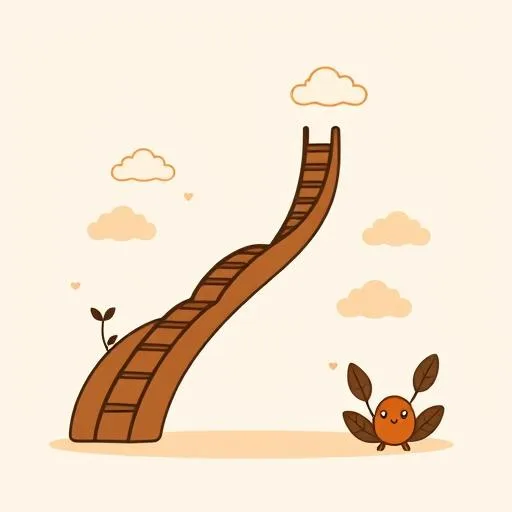
Remember those heart-lifting playground moments when your little one finally swings to the next monkey bar, trembling hands gripping tight? That triumphant climb mirrors life’s classic career ladder—except now, the very first rung might be vanishing. Experts like LinkedIn’s Aneesh Raman point out artificial intelligence is ‘breaking the bottom rung’ of the corporate ladder, threatening jobs that once served as stepping stones. Dario Amodei of Anthropic predicts up to half of entry-level white-collar roles could disappear within five years. And let’s not forget icons like Mary Barra—GM’s CEO who started on assembly lines at 18. So what does this mean for our kids? If those humble beginnings vanish, what foundation will tomorrow’s leaders stand on? This isn’t just about paychecks; it’s about how our kids find their footing in a world where the old rules are crumbling. Let’s untangle this together, not with panic, but with the quiet confidence we gather watching our children master life’s wobbly first steps.
When Stepping Stones Wash Away
Picture your toddler carefully stepping onto playground stones, testing each one before moving forward. That’s how generations built careers—entry-level jobs were those safe, steady stones. But research from Revelio Labs shows U.S. entry-level postings have dropped 35% since 2023, with AI reshaping how companies hire. It’s like someone quietly removed half the stones mid-crossing. Young grads once fetched coffee while learning the ropes; now, AI handles routine tasks before humans step in. As Aneesh Raman put it, ‘Breaking first is the bottom rung.’ This isn’t corporate jargon—it’s the erosion of a path that let people grow roots, make mistakes, and earn trust slowly. I see it play out at neighborhood parks: kids building sandcastles brick by brick, only to have waves gently dissolve the foundation. We don’t scold the tide; we teach them to rebuild smarter. Similarly, if the classic career ladder dissolves, we’re not powerless. Our parenting superpower? Helping kids find solid ground in change. Data confirms the shift, but humans have always adapted. Let’s nurture that instinct in our children.
Redefining ‘First Jobs’ Through Curiosity

What if the first job isn’t in an office at all? Think of how kids learn naturally—turning cardboard boxes into spaceships or negotiating playground trades with fierce diplomacy. Those moments build future-proof skills no algorithm can replicate: creativity, empathy, resilience. Instead of worrying about vanishing entry roles, we can reframe early experiences as playgrounds for growth. At home, when my daughter paints wildly outside the lines, I don’t correct her—I ask, ‘What story is this color telling?’ That curiosity is her real ‘entry-level’ training. Dario Amodei’s forecasts remind us to prioritize human magic over technical tasks. Why not try this: Turn chores into discovery zones. ‘Can we sort laundry by color patterns like a puzzle?’ invites problem-solving. Or during a walk, ‘What would a robot need to learn to appreciate this sunset?’ blends tech awareness with emotional depth. These aren’t academic drills—they’re joyful sparks lighting the way to adaptable thinking. Young workers are already pivoting creatively, using AI as a tool rather than a replacement. Our kids, raised with playful exploration, might leap even further.
Cultivating Ladders That Bend, Not Break

The old career ladder assumed a straight climb, but real life—like parenting—is full of zigzags. When my daughter stumbles on her bike, I don’t hand her a scooter; I ask, ‘What felt shaky just now?’ That focus on reflection, not perfection, builds grit. Similarly, if traditional entry roles shrink, we prepare kids for fluid paths by celebrating curiosity over credentials. Picture this: Instead of ‘You must get that first job!’ it’s ‘What fascinates you? Let’s explore it.’ During a rainy afternoon, building forts with blankets becomes a lesson in collaboration—they negotiate roles, troubleshoot collapsing walls, and laugh when it caves in. That’s resilience! Jobs of the future will prioritize adaptability: someone who can shift from debugging code to calming a stressed teammate. Our role? Nurture emotional intelligence as fiercely as ABCs. Notice how they handle a game loss—‘Your turn next!’ instead of tears? That’s leadership brewing. The career ‘ladder’ may become a jungle gym—many ways up, sideways, even down before up. And honestly? That’s more fun to navigate with kids who see barriers as invitations to innovate.
Planting Seeds for What Machines Can’t Harvest
AI excels at tasks, but it can’t replace the warmth of a shared ‘aha!’ moment when your child solves a puzzle. Or the quiet pride when they comfort a friend. Those human sparks—kindness, intuition, moral courage—are the bedrock of enduring careers. Consider journalism: AI aggregates facts, but only humans ask, ‘Why does this story matter to our neighbors?’ As parents, we’re gardeners tending these strengths daily. When life feels glitchy—spilled juice, forgotten homework—we model calm problem-solving: ‘What’s one small fix we can try together?’ That’s the stuff of future leaders. And fun fact: Kids mimic us more than screens. So next time you’re meal-planning, invite them to brainstorm—‘Could robots cook this? What would they miss?’ It’s not about tech fluency; it’s about understanding its limits. By keeping play unstructured (no extra classes for a 7-year-old!), we preserve space for wonder. That sandcastle they built might wash away, but the joy of creation? That’s what anchors them when ladders shake. Their first ‘career’ is being a curious human—and that path stays forever green.
Source: AI isn’t just ending entry-level jobs. It’s ending the career ladder, CNBC, 2025/09/07
